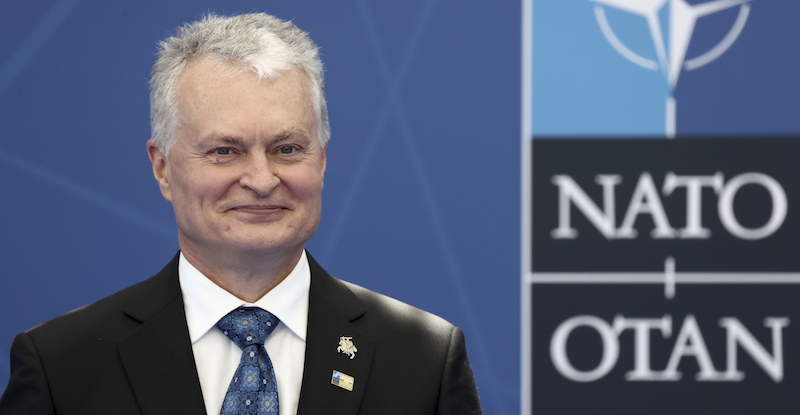Because China is angry with Lithuania

On July 20 this summer, Taiwan’s Foreign Minister he wrote on Twitter: “Taiwan and Lithuania are close allies, bound by an unshakable faith in the power of freedom and democracy.” The Lithuanian government has just decided to open a “Taiwan Representative Office” (ie an unofficial embassy) in its country. Then the Chinese Foreign Minister accused Lithuania of having exceeded “Red lineA series of political and commercial retaliation has begun against the small country that, in recent months, has generated one of the most prominent diplomatic issues between Europe and China.
China was furious that most countries in the world would, ordinarily, allow the opening of a “Taipei representative office” on its territory: a way to avoid referring directly to Taiwan, which China claims sovereignty over. On the other hand, Lithuania directly mentioned Taiwan, treating it practically as an independent country, even though the island is not diplomatically recognized by most countries in the world. For China, this is an unacceptable provocation.
He wasn’t the only one. In May, Lithuania came Retreat from the group”17 + 1“(From the number of countries affiliated with it, in addition to China), a trade and investment cooperation project between China and some Central and Eastern European countries, promoted by the Chinese Ministry of Foreign Affairs and considered one of the founding elements of China’s influence in Europe. Lithuanian Foreign Minister Gabrilius Landsbergis said at the time that Staying in that group would have meant weakening the European Union.
Recently, there was still talk of disputes between China and Lithuania when the Lithuanian government advised its citizens not to buy or stop using some smartphone models produced and sold by Chinese companies, after discovering problems with privacy protection and control systems.
– Read also: The Lithuanian government advises against using some Chinese smartphones
The Global Times, a popular newspaper owned by the Communist Party of China expressing nationalist stances, He knew Lithuania is the vanguard of anti-Chinese Europe.
Faced with what it considers serious provocations, China responded with great harshness: for the first time in a European country, it recalled its ambassador from Lithuania, told the Lithuanian ambassador to leave Beijing, and suspended trains and exports. Certain goods from Lithuania to China, while carrying out various other forms of economic and trade retaliation.
The Chinese reaction may seem disproportionate, given that Lithuania is regionally and economically small compared to China. Less than 3 million people live in Lithuania, nearly one and a half billion in China, and the Lithuanian economy as well 270 times Smaller than the Chinese. Speaking of this brawl, The New York Times called LithuaniaBaltic fishWhich angered the Chinese superpower in the world.
However, despite being very small, Lithuania could pose a problem to China if it refused to be recognized and treated as a global superpower.
First of all, Lithuania is an important transit passage for goods from China to Europe, especially by train: in 2017, the Lithuanian government sign it Even a memorandum of understanding with China to join the “Belt and Road” Initiative (BRI), often called the “New Silk Road”, is China’s massive investment program to build trade infrastructure, which is key to expanding China’s influence in the world. But things have changed since then as we have seen.
Second, China fears that Lithuania’s decision to adopt a “values-based” foreign policy and uphold democratic principles, as Minister Landsbergis said recently, may lead other countries to do the same. For this reason, China’s reaction should also be read on a more symbolic and explicit level. The dispute with Lithuania serves China to show other EU countries that failure to treat China as a great power has direct economic and diplomatic consequences. A European diplomat living in China commented on the case He said a Politico: «It’s like the Chinese saying “Kill the chicken to scare the monkey”: Beijing tells everyone that anyone who dares to challenge China will face dire consequences.”.
However, for now, Lithuania does not take revenge and threats seriously, especially since its relations with China are loose enough that it does not run the risk of serious economic repercussions.
The United States immediately showed its support for Lithuania: Landsbergis recently met with Foreign Minister Anthony Blinken. On the contrary, European countries – which have important economic interests to defend in China – have remained more neutral, without taking an open and common position.
For Lithuania, the reasons for confronting Chinese influence are different, partly ideological and partly convenient. First of all, the hostility between the two countries is also connected with the history of Lithuania, the first Soviet republic that declared independence from Moscow, in 1990, whose identity is also based on a deep hatred of communist authoritarianism. Second, it may be beneficial for a small country like Lithuania, according to some analysts, to move closer to a politically isolated but economically connected country like Taiwan.
according toAnalytics from Politico, Lithuania can afford to provoke China precisely because of its small size. Most of the important countries in the European Union, such as France and Germany, have important economic links with China, and cannot easily take decisive positions on China or provoke it as Lithuania did with reference to Taiwan. Other European countries, such as Greece or Hungary, depend on China and may be less. China’s economic investment in Lithuania remains low, writes Lithuania PoliticoTherefore, he “has nothing to lose.”

Communicator. Reader. Hipster-friendly introvert. General zombie specialist. Tv trailblazer






